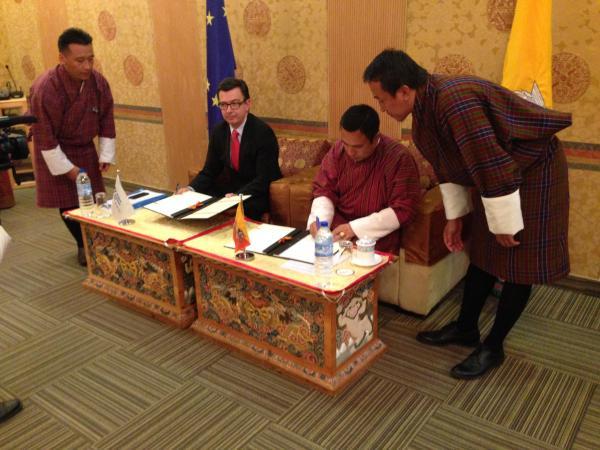
On Thursday 4 December, the European Investment Bank (EIB), the European Union’s long-term financing institution and Kingdom of Bhutan signed a Framework Agreement under which the Bank can start financing capital investments in the country.
The agreement was signed by the EIB Vice-President with special responsibility for the Bank’s activities in Asia, Román Escolano and his Excellency Lyonpo Namgay Dorji, Finance Minister of the Royal Government of Bhutan in Thimphu, capital of Bhutan.
The EIB is the long-term lending institution of the European Union and its shareholders are the EU Member States. Its remit is to make long-term finance available for viable projects in order to contribute towards EU policy objectives. Outside the EU, the Bank support projects that contribute to economic development in countries that have signed association or cooperation agreements with the EU or its Member States.
In Asia, the European Investment Bank has so far signed Framework Agreements with Bangladesh, Cambodia, China, India, Indonesia, Laos, Maldives, Mongolia, Nepal, Pakistan, the Philippines, Sri Lanka, Thailand, Vietnam and Yemen.
The signing of the Framework Agreement represents the first step of the EIB to support development projects in Bhutan. EIB is cooperating closely with the European Commission and the EEAS, in support of the EU’s policy objectives in the country. In pursuing sustainable investments in Bhutan, the Kingdom of Bhutan and EIB already discussed potential projects in the country, namely in the areas of energy and water infrastructure.
The EIB has been active in Asia since 1993 under mandates granted by the EU Council and the European Parliament. During this period the EU bank has signed contracts in the region for a total of EUR 5.6 billion. On 1 July 2014 the EU’s new External Lending Mandate, covering the period 2014-2020, entered into force. Part of the current mandate is dedicated to Asia, enabling the EIB to finance operations that contribute to climate change mitigation and adaptation or the development of sustainable economic infrastructure. Additionally, the EIB can also draw on its own resources under the Climate Action and Environment Facility or the Strategic Projects Facility to finance relevant projects on a selective basis.

